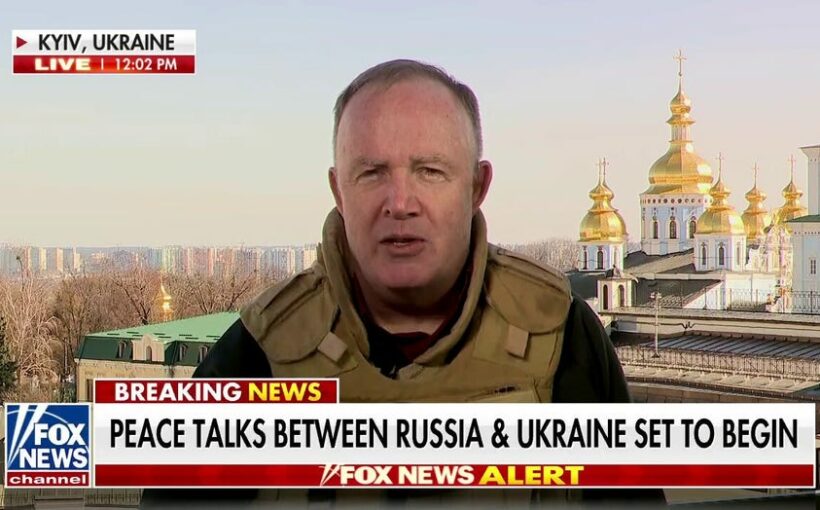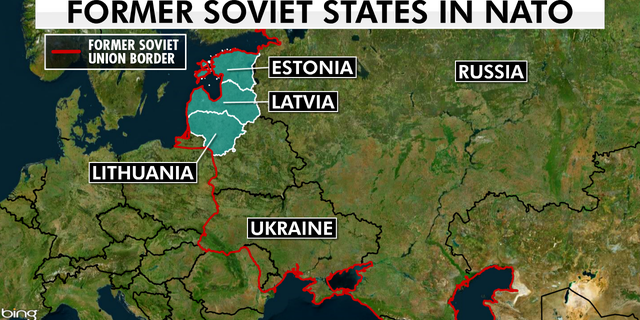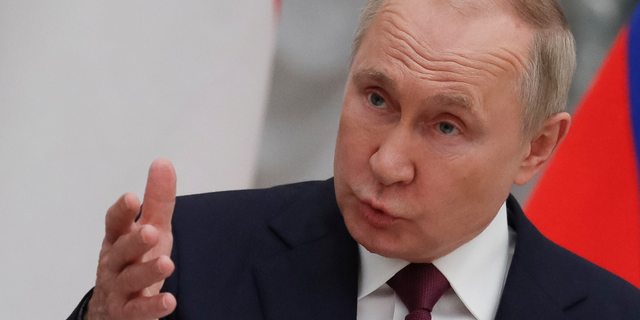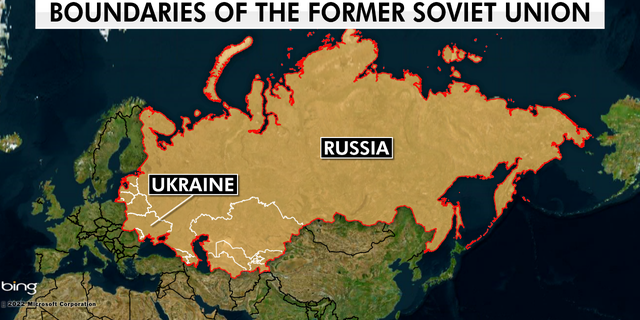Peace talks expected to begin in Belarus between Russian, Ukrainian officials
Steve Harrigan reports the latest on the negotiations from Kyiv, Ukraine.
“I’ve read most of everything he’s written,” President Biden said of Russian President Vladimir Putin last week. “He has much larger ambitions in Ukraine. He wants to, in fact, reestablish the former Soviet Union. That’s what this is about.”
Many experts believe that Biden is right. In an often cited and perhaps highly revealing comment years ago, Putin said that he believed the fall of the Soviet Union was the greatest geopolitical tragedy of the 20th century.
Putin currently has his hands full with a stronger-than-expected resistance to his war on Ukraine – including at home – though his massive military is expected to eventually prevail. Most believe, however, that it’s not a matter of if, but rather when and where, the Russian president begins pressuring, coercing or attacking other countries as he tries to reconstitute something akin to the Soviet Union.
The Baltics
Many are keeping one eye on Estonia, Latvia and Lithuania as Putin wages his war on Ukraine. That’s because the three Baltic States sit sandwiched between Russia, its close ally Belarus, the Baltic Sea and the Russian territory of Kaliningrad.
A map shows the boundaries of the former Soviet Union, with NATO "Baltic" states highlighted. Many speculate those countries could face covert action and cyberattacks from Russia soon.
(Fox News)
Because all three countries are NATO members, it’s not expected that Putin would take physically aggressive action against them, according Penn State professor emerita of political science Donna Bahry.
“The Baltics are vulnerable, but a direct Russian military strike against NATO countries seems unlikely for now,” Bahry told Fox News Digital. “That doesn’t rule out Russian efforts such as cyberattacks and other covert actions. In fact, all three Baltic countries have experienced cyberattacks from Russia for some years.”
Former Defense Intelligence Agency officer Rebekah Koffler also told Fox News Digital that a military attack is highly unlikely. But she said Putin may hit the Baltics with “non-kinetic actions” that could include not only cyberattacks but electronic warfare, “any kind of destabilization like covert ops,” or even staging a protest.
“He is not gonna go with military operations or any kind of kinetic action against any NATO country such as the Baltics,” she said. “But as the conflict escalates, and especially if he’s on the losing side, I fully expect him to ratchet up non-kinetic actions.”
R Street Institute Cybersecurity and Emerging Threats Director Tatyana Bolton, meanwhile, told Fox News Digital that while Putin’s timeline may not be immediate, she believes Putin wants to eventually gain control of the Baltics. She said the West should do everything in its power to salvage Ukraine, which she said would be key to deterring any future Putin attack on the Baltics.
Russian President Vladimir Putin during a news conference in the Kremlin in Moscow, Russia, Tuesday, Feb. 1, 2022.
(Yuri Kochetkov/Pool Photo via AP)
“This could take months or years, but I think that’s exactly what he’s trying to do. He’s trying to take one piece at a time to reassemble what he believes was the greatest country in the world,” Bolton said.
Koffler also said it’s highly unlikely Russia would take kinetic action soon against other NATO members or any other “truly Western country.” This would include, she said, non-NATO members Finland and Sweden, despite speculation about Putin’s interest in the Swedish island of Gotland.
Other post-Soviet states
Romania and Georgia may face a more immediate threat than the Baltics, Bahry and Koffler said.
Any area where the Russians have their quote-unquote peacekeeping forces… or anything that has disputed territory [is vulnerable].
“Will Putin now move quickly against other post-Soviet states? More military attacks on other post-Soviet countries seem unlikely for now,” Bahry said. “But Putin could ramp up pressure on the countries with closer ties to the EU, such as Moldova and Georgia — for example, by recognizing the independence of Transnistria or annexing South Ossetia.”
Koffler said those former Soviet states are indeed “vulnerable,” because they are not in NATO and because they have disputed territory.
“Definitely a threat to Moldova,” Koffler said. “Any area where the Russians have their quote-unquote peacekeeping forces… or anything that has disputed territory such as Transnistria in Moldova, such as Abkhazia and South Ossetia in Georgia.”
Koffler said those areas “could be on the target list, including on this phase of the operation, especially if he is perceiving that he’s on the losing side.” What could hold Putin back from going after those areas, Koffler said, is the fact so much of his military is preoccupied in Ukraine for now.
The boundaries of the former Soviet Union are shown on a map. Former Defense Intelligence Agency officer Rebekah Koffler said any former Soviet state that’s not in NATO is vulnerable to Russian action right now.
(Fox News)
What the West can do
Despite the fact that kinetic action is unlikely, Koffler said it is still critical to “shore up” the Baltics with Western troops. But she said that must be done carefully “so that Putin doesn’t interpret our actions as offensive instead of defensive… Remember, he’s paranoid.”
Retired CIA station chief Dan Hoffman also acknowledged the trouble with the perception of NATO building up troops in the Baltics. He said a buildup of Western forces in those three states bordering Russia would feed into the “enemy at the gates” propaganda Putin uses on his people. But, Hoffman said, it’s still critical to increase the western military presence in the Baltics.
“Even if there’s a 2% chance Putin invades Estonia, you better be there and ready with a whole lot of troops or else that’s 100% of you getting your a– kicked,” he said.
Bahry said “NATO would have difficulty countering a direct Russian strike on the Baltics right now,” but that the SWIFT sanctions the West is imposing are “a big step.” In the long term, Bahry said, energy independence may be the West’s best move to counter Russia.
“European countries should be diversifying both the types and supplies of energy they use, to reduce dependence on Russian gas exports,” she said. “That’s not just an energy security issue for Europe. It’s also a way to reduce the flow of revenue going to the Russian government and its military.”
Source: Read Full Article




